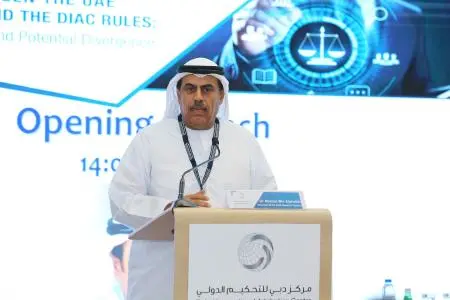PHOTO
- The contemplated new DIAC Rules will aim to ensure better alignment with the developments in the international arbitration field
Dubai, UAE: Dubai International Arbitration Centre (DIAC) recently held its annual conference in Dubai examining key aspects of the new UAE Arbitration Law and their impact on the DIAC Arbitration Rules, which apply to all disputes referred to DIAC arbitration.
The conference, organised as part of Dubai Arbitration Week, attracted 200 participants, including legal experts, judges, businessmen and academics. Presentations and sessions familiarized attendees with the standards and procedures for dispute resolution under the existing DIAC Arbitration Rules in light of the new UAE Arbitration Law.
During the conference, it was announced that the expected new DIAC Arbitration Rules, aligned with internationals standards, will cover important matters of interest the international legal community.
Panel discussions during the conference outlined the key benefits and improvements introduced under the UAE Arbitration Law of 2018, including a more secure framework for arbitration in the UAE and establishing it as a more arbitration-friendly jurisdiction.
During his opening remarks, Dr. Ahmad Bin AlShaikh, Chairman of the DIAC Board of Trustees, shed light on the newly-formed board’s strategies and plans aimed at boosting Dubai’s position as a global centre for commercial arbitration. The Chairman emphasised the purpose of the annual conference as an ideal platform to inform arbitrators, legal practitioners and the business community in Dubai about important arbitration-related matters and best practices in resolving disputes through arbitration and conciliation.
For his part, Dr. Ahmad Bin Hezeem, Vice Chairman of the DIAC Board of Trustees and Chairman of the DIAC Executive Committee, gave an overview of DIAC’s history and its activities. He revealed that more than 2,500 cases have already been administered by DIAC since 2007, with an average value of disputes settled per year totalling to AED 5.6 billion since 2010 until present.
Dr. Bin Hezeem highlighted the Centre’s experience in managing complex disputes relating to different sectors, including real estate, engineering and construction, corporate and commercial, and oil and gas.
The conference featured a panel discussion joined by Nassif Boumalhab, Lead Partner - Clyde & Co LLP; Fatima Balfaqeeh, Founder & Managing Director of RKAH Consultancy; and Dr. Mohamed S. Abdel Wahab, Founding Partner - Zulficar & Partners. The panellists examined a wide range of arbitration practices related to pre-award issuance procedures, the validity of arbitration agreements, including following annulment of final awards, various approaches to the issue of capacity to sign arbitration agreements and potential challenges of awards on jurisdiction and other interim awards.
Joining a separate discussion panel entitled Post-Award Issuance Considerations: from Issuance to the Enforcement of the Award were Ali Al Aidarous, Founder and Managing Attorney - Ali Al Aidarous; Reza Mohtashami, Partner - Three Crowns LLP; and Sally Kotb, Counsel - Baker & McKenzie Habib Al Mulla. The panellists discussed existing requirements for final awards, signing of arbitral awards, benchmarking the DIAC Rules with the UAE Arbitration Law, processes for enforcements under the new UAE Arbitration Law and
recent amendments and court decisions related to the regime of enforcement of foreign awards.
The conference concluded with the closing remarks from Dr. Hassan Arab, member of the DIAC Board of Trustees, who summarised the outcomes of the panel discussions and thanked the participants and the speakers for being part of the annual DIAC Conference.
Dubai International Arbitration Centre (DIAC), being the largest arbitration centre in the Middle East, provides local and international business communities with arbitration and conciliation services. DIAC was initially established by the Dubai Chamber of Commerce and Industry in 1994 as the Centre for Commercial Conciliation and Arbitration.
Established in 1965, the Dubai Chamber of Commerce & Industry is a non-profit public entity, whose mission is to represent, support and protect the interests of the business community in Dubai by creating a favourable business environment, supporting the development of business, and by promoting Dubai as an international business hub.
Follow us on:
http://www.linkedin.com/company/dubai-chamber-of-commerce-&-industry/
www.youtube.com/DubaiChamberTV
www.instagram.com/dubaichamber
For more information, please contact:
Ruba Abdel Halim
Manager, PR & Corporate Communications
Tel: +971 4 2028450
Email: ruba.halim@dubaichamber.com
Disclaimer: The contents of this press release was provided from an external third party provider. This website is not responsible for, and does not control, such external content. This content is provided on an “as is” and “as available” basis and has not been edited in any way. Neither this website nor our affiliates guarantee the accuracy of or endorse the views or opinions expressed in this press release.
The press release is provided for informational purposes only. The content does not provide tax, legal or investment advice or opinion regarding the suitability, value or profitability of any particular security, portfolio or investment strategy. Neither this website nor our affiliates shall be liable for any errors or inaccuracies in the content, or for any actions taken by you in reliance thereon. You expressly agree that your use of the information within this article is at your sole risk.
To the fullest extent permitted by applicable law, this website, its parent company, its subsidiaries, its affiliates and the respective shareholders, directors, officers, employees, agents, advertisers, content providers and licensors will not be liable (jointly or severally) to you for any direct, indirect, consequential, special, incidental, punitive or exemplary damages, including without limitation, lost profits, lost savings and lost revenues, whether in negligence, tort, contract or any other theory of liability, even if the parties have been advised of the possibility or could have foreseen any such damages.




















